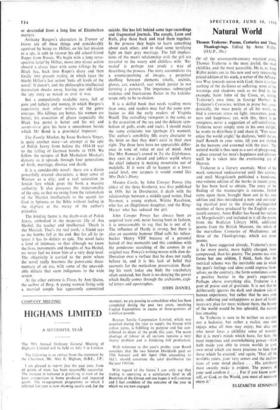Natural World
Thomas Traherne: Poems, Centuries and Three Thanksgivings. Edited by Anne Ridler. (O.U.P., 30s.)
OF all the seventeenth-century mystical Poets, Thomas Traherne is the most joyful, the most childlike, and the most accessible. He is, as Anne Ridler points out in this new and very reasonably priced edition of his work, a writer of the Affirma- tive Way towards union with God; there is in him nothing of the darkness or suffering, none of the warnings and shadows such as we find in, for example, Saint John of the Cross, or, during Traherne's own time, in George Herbert. In Traherne's Centuries, written in prose but, para- doxically, the most poetic of all his work, we find a constant stress on light, innocence, good- ness and happiness; yet, with this, there is no smugness, never a suggestion of self-satisfaction. Traherne never simply rests in his own delight; he wants to distribute it and share it. 'You never enjoy the world aright,' he declares, 'until the sea itself floweth in your veins, till you are clothed in the heavens and crowned with the stars.' The natural world is thus seen as a sort of playground, a place created for man's happiness and pleasure until he is taken into the .everlasting joy of Heaven.
Traherne is a literary anomaly. Most of his work remained undiscovered until this century, and until Margoliouth published a handsome, two-volume edition of the works in recent years, he has been hard to obtain. The story of the finding of the manuscripts is curious. Dobell came upon them, brought them out in his own edition and thus introduced a new and outstand- ing mystical poet to the already distinguished number of those pfoduced by the English seven- teenth century. Anne Ridler has based her edition on Margoliouth's and included in it all the poems from the Bodleian Library MSS, additional poems from the British Museum, the whole of the marvellous Centuries of Meditations, and three of the Thanksgivings, which are prose poems.
As I have suggested already, Traherne's prose is far more poetic, more highly charged, more compressed, than his poetry. The poems use strict forms but one seldom, I think, feels that the metrical scheme was the inevitable one in which the poet's feelings and ideascould express them- selves; on the contrary, the form sometimes seems a positive barrier to the poet's experience. Perhaps above everything else, Traherne is a poet of praise and of gratitude. It is not that he deliberately ignores the dark and shadosi side of human experience, but rather that he sees even pain, suffering and unhappiness as part of God's necessary plan for men; without them, the beauty of the world would be less splendid, the ecstasy less amazing.
So Traherne is seen to be neither an escapist nor a hedonist, but rather a realist, one who enjoys what all men may enjoy, but also one who never loses a childlike sense of wonder. But it is men's minds which have, for him, the most imperious and overwhelming power—'God hath made you able to create worlds in your own mind which are more precious to him than those which he created,' and again, 'That all the worldois yours, your. very senses and the inclina- tions of your mind declare . . . His attributes most sweetly make it evident. The pOwers of your soul confirm it . . . For if you knOw your- self, or God, or the World, you must or necessity enjoy it.'
ELIZABETH JENNINGS


































 Previous page
Previous page